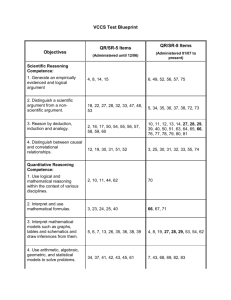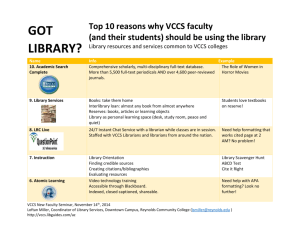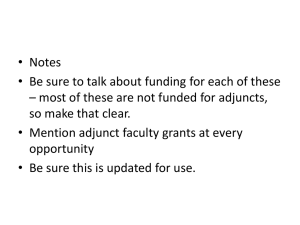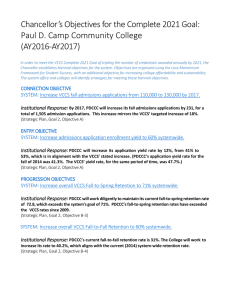ADVISORY COUNCIL OF PRESIDENTS TITLE: BACKGROUND:
advertisement
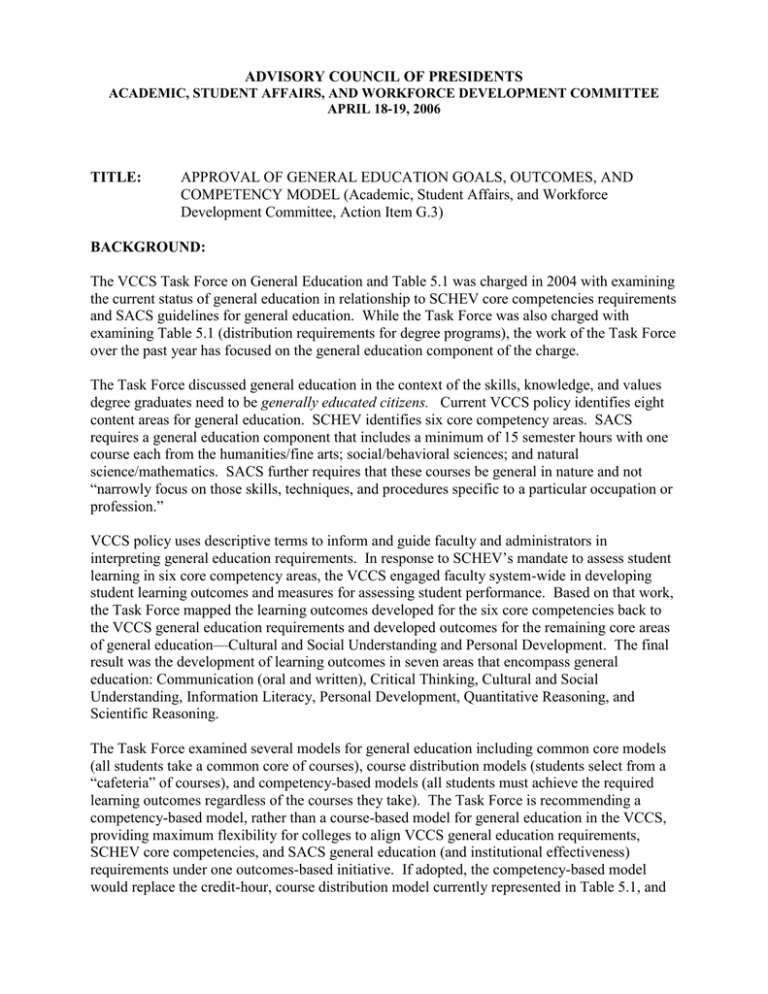
ADVISORY COUNCIL OF PRESIDENTS ACADEMIC, STUDENT AFFAIRS, AND WORKFORCE DEVELOPMENT COMMITTEE APRIL 18-19, 2006 TITLE: APPROVAL OF GENERAL EDUCATION GOALS, OUTCOMES, AND COMPETENCY MODEL (Academic, Student Affairs, and Workforce Development Committee, Action Item G.3) BACKGROUND: The VCCS Task Force on General Education and Table 5.1 was charged in 2004 with examining the current status of general education in relationship to SCHEV core competencies requirements and SACS guidelines for general education. While the Task Force was also charged with examining Table 5.1 (distribution requirements for degree programs), the work of the Task Force over the past year has focused on the general education component of the charge. The Task Force discussed general education in the context of the skills, knowledge, and values degree graduates need to be generally educated citizens. Current VCCS policy identifies eight content areas for general education. SCHEV identifies six core competency areas. SACS requires a general education component that includes a minimum of 15 semester hours with one course each from the humanities/fine arts; social/behavioral sciences; and natural science/mathematics. SACS further requires that these courses be general in nature and not “narrowly focus on those skills, techniques, and procedures specific to a particular occupation or profession.” VCCS policy uses descriptive terms to inform and guide faculty and administrators in interpreting general education requirements. In response to SCHEV’s mandate to assess student learning in six core competency areas, the VCCS engaged faculty system-wide in developing student learning outcomes and measures for assessing student performance. Based on that work, the Task Force mapped the learning outcomes developed for the six core competencies back to the VCCS general education requirements and developed outcomes for the remaining core areas of general education—Cultural and Social Understanding and Personal Development. The final result was the development of learning outcomes in seven areas that encompass general education: Communication (oral and written), Critical Thinking, Cultural and Social Understanding, Information Literacy, Personal Development, Quantitative Reasoning, and Scientific Reasoning. The Task Force examined several models for general education including common core models (all students take a common core of courses), course distribution models (students select from a “cafeteria” of courses), and competency-based models (all students must achieve the required learning outcomes regardless of the courses they take). The Task Force is recommending a competency-based model, rather than a course-based model for general education in the VCCS, providing maximum flexibility for colleges to align VCCS general education requirements, SCHEV core competencies, and SACS general education (and institutional effectiveness) requirements under one outcomes-based initiative. If adopted, the competency-based model would replace the credit-hour, course distribution model currently represented in Table 5.1, and colleges would be required to demonstrate student achievement of general education goals and objectives through a comprehensive assessment process. The ASAC Educational Programs Committee reviewed the proposed general education goal areas, student learning outcomes, and competency model at its March 2006 meeting. A slight revision was made. The revised set of general education goal areas and student learning outcomes, together with the competency-based model of general education were approved by ASAC. ACTION RECOMMENDED: That the Advisory Council of Presidents recommends that the State Board for Community Colleges approve adoption of: o the seven goal areas that encompass general education in the VCCS o the competency-based model of general education PREVIOUSLY REVIEWED BY: VCCS Academic Services and Research staff VCCS Academic and Student Affairs Council (approved March 2006) RATIONALE: This competency-based model of general education was developed through a faculty-driven review process with system-wide input. The Task Force reached consensus about the purposes of general education in the VCCS curricular structure and revised the goals and objectives based on input from faculty and academic deans system-wide. AAC&U has identified Virginia’s core competencies as an effective model for other states to follow in assessing student learning. According to AAC&U’s Principles of Good Practice for the “new academy,” “…colleges and universities will model the purposeful action—the intentionality—they expect of their students. Faculty members will focus more centrally on goals for student learning in both courses and programs, not just on the subject matter taught or the number of credits earned. Leaders will use resources strategically to build a culture centered on learning.” Adoption of the competency-based model of general education aligns Virginia’s community colleges with current thinking in higher education that “a practical liberal education is the best preparation for all students in a rapidly changing world.” Furthermore, the model provides an effective framework for VCCS colleges to respond to requests from stakeholders for evidence of the knowledge, skills and attitudes achieved by degree graduates. RESOURCE PERSONS: Dr. Monty Sullivan, Vice Chancellor, Academic Services and Research, msullivan@vccs.edu, 804.819.4970 Dr. Susan S. Wood, Assistant Vice Chancellor for Educational Programs and Instructional Technology, swood@vccs.edu, 804.819.4936 PROPOSED REVISION TO VCCS POLICY MANUAL REGARDING GENERAL EDUCATION Current policy language: 5.0.2 General Education General education is that portion of the collegiate experience which addresses the knowledge, skills, attitudes, and values characteristic of educated persons. It is unbounded by disciplines and honors the connections among bodies of knowledge. The following eight elements embody the essence of general education: communication; learning skills; critical thinking; interpersonal skills and human relations; computational and computer skills; understanding culture and society; understanding science and technology; and wellness. The associate degree programs within the Virginia Community College System support a collegiate experience that focuses on the above definition and attendant elements. Locally developed general education goals covering the eight general education elements shall be included in the catalog of each college. Proposed policy language: 5.0.2 General Education General education is that portion of the collegiate experience that addresses the knowledge, skills, attitudes, and values characteristic of educated persons. It is unbounded by disciplines and honors the connections among bodies of knowledge. VCCS degree graduates will demonstrate competency in the following general education areas: •Communication •Critical Thinking •Cultural and Social Understanding •Information Literacy •Personal Development •Quantitative Reasoning •Scientific Reasoning The associate degree programs within the Virginia Community College System support a collegiate experience that focuses on the above definition and attendant areas. The general education outcomes shall be included in the catalog of each college. PROPOSED STUDENT LEARNING OUTCOMES FOR EACH OF THE GENERAL EDUCATION GOAL AREAS VCCS degree graduates will demonstrate competency in the following general education areas: 1. Communication A competent communicator can interact with others using all forms of communication, resulting in understanding and being understood. Degree graduates will demonstrate the ability to 1.1 understand and interpret complex materials; 1.2 assimilate, organize, develop, and present an idea formally and informally; 1.3 use standard English; 1.4 use appropriate verbal and non-verbal responses in interpersonal relations and group discussions; 1.5 use listening skills; and 1.6 recognize the role of culture in communication. 2. Critical Thinking A competent critical thinker evaluates evidence carefully and applies reasoning to decide what to believe and how to act. Degree graduates will demonstrate the ability to 2.1 discriminate among degrees of credibility, accuracy, and reliability of inferences drawn from given data; 2.2 recognize parallels, assumptions, or presuppositions in any given source of information; 2.3 evaluate the strengths and relevance of arguments on a particular question or issue; 2.4 weigh evidence and decide if generalizations or conclusions based on the given data are warranted; 2.5 determine whether certain conclusions or consequences are supported by the information provided; and 2.6 use problem solving skills. 3. Cultural and Social Understanding A culturally and socially competent person possesses an awareness, understanding, and appreciation of the interconnectedness of the social and cultural dimensions within and across local, regional, state, national, and global communities. Degree graduates will demonstrate the ability to 3.1 assess the impact that social institutions have on individuals and culture—past, present, and future; 3.2 describe their own as well as others’ personal ethical systems and values within social institutions; and 3.3 recognize the impact that arts and humanities have upon individuals and cultures. 3.4 recognize the role of language in social and cultural contexts. 3.5 recognize the interdependence of distinctive world-wide social, economic, geopolitical, and cultural systems 4. Information Literacy A person who is competent in information literacy recognizes when information is needed and has the ability to locate, evaluate, and use it effectively. (adapted from the American Library Association definition) Degree graduates will demonstrate the ability to 4.1 determine the nature and extent of the information needed; 4.2 access needed information effectively and efficiently; 4.3 evaluate information and its sources critically and incorporate selected information into his or her knowledge base; 4.4 use information effectively, individually or as a member of a group, to accomplish a specific purpose; and 4.5 understand many of the economic, legal, and social issues surrounding the use of information and access and use information ethically and legally. 5. Personal Development An individual engaged in personal development strives for physical well-being and emotional maturity. Degree graduates will demonstrate the ability to 5.1 develop and/or refine personal wellness goals; and 5.2 develop and/or enhance the knowledge, skills, and understanding to make informed academic, social, personal, career, and interpersonal decisions. 6. Quantitative Reasoning A person who is competent in quantitative reasoning possesses the skills and knowledge necessary to apply the use of logic, numbers, and mathematics to deal effectively with common problems and issues. A person who is quantitatively literate can use numerical, geometric, and measurement data and concepts, mathematical skills, and principles of mathematical reasoning to draw logical conclusions and to make well-reasoned decisions. Degree graduates will demonstrate the ability to 6.1 use logical and mathematical reasoning within the context of various disciplines; 6.2 interpret and use mathematical formulas; 6.3 interpret mathematical models such as graphs, tables and schematics and draw inferences from them; 6.4 use graphical, symbolic, and numerical methods to analyze, organize, and interpret data; 6.5 estimate and consider answers to mathematical problems in order to determine reasonableness; and 6.6 represent mathematical information numerically, symbolically, and visually, using graphs and charts. 7. Scientific Reasoning A person who is competent in scientific reasoning adheres to a self-correcting system of inquiry (the scientific method) and relies on empirical evidence to describe, understand, predict, and control natural phenomena. Degree graduates will demonstrate the ability to 7.1 generate an empirically evidenced and logical argument; 7.2 distinguish a scientific argument from a non-scientific argument; 7.3 reason by deduction, induction and analogy; 7.4 distinguish between causal and correlational relationships; and 7.5 recognize methods of inquiry that lead to scientific knowledge. The Virginia Community College System’s General Education Taskforce Re-examining General Education Executive Summary The General Education Taskforce was charged with examining the current status of general education in relationship to the SCHEV core competencies requirements, and the new SACS guidelines for general education. While the Taskforce was also charged with examining Table 5.1, initial work of the Taskforce has focused on the general education component of the charge. For the VCCS, General Education pertains to all two-year graduates. The Taskforce’s discussions centered on the skills, knowledge, and value systems students need to be generally educated citizens. The concept of a generally educated citizen is similar to Newton’s Effective Citizen Model of general education and reinforces the VCCS definition of general education which states that general education is “that portion of the collegiate experience which addresses the knowledge, skills, attitudes and values characteristic of educated persons.” While the VCCS General Education requirements list eight areas of general education, SCHEV outlines only six core competency areas. In addition, while the VCCS general education areas use key descriptive terms to inform and guide faculty and academic administrators, the VCCS response to the SCHEV core competencies outline student learning outcome objectives. Virginia’s core competencies have also been held up as a model for other states by AAC&U's president and director of programs. In order to identify areas of overlap, the Taskforce members mapped back the objectives within the six core competency objectives to the eight general education areas. Objectives from all six core competency areas fit within the existing general education requirements. The core competency objectives also had the advantage of being faculty driven. Each set of objectives was produced or revised by area advisory groups consisting of faculty members from across the VCCS. Because no advisory group was in place to review draft Cultural and Social Understanding Objectives and the Personal Development Objectives, these draft objectives were sent out to faculty members at various colleges for input. The result was the development of objectives in seven areas: Communication, Critical Thinking, Cultural and Social Understanding, Information Literacy, Personal Development, Quantitative Reasoning and Scientific Reasoning. The General Education Taskforce examined several general education delivery models including core programs, distribution programs, and competency-based models. The Taskforce proposes the use of a competency-based model for general education instruction delivery. This model provides the individual VCCS colleges with the maximum amount of flexibility in delivering instruction while providing a mechanism for ensuring that students across the VCCS are meeting the objectives set forth in the General Education requirements. The model also allows the VCCS colleges to meet their core competency reporting requirements without duplicating assessment efforts. Finally, the model will provide individual colleges with student learning outcomes data in the area of general education for the purpose of meeting the new general education guidelines set forth by SACS. The competency-based model allows individual colleges the freedom to align VCCS general education requirements, SCHEV core competencies and SACS general education requirements under one outcomes-based initiative. Schematic of VCCS Curriculum Structure for Associate Degrees
